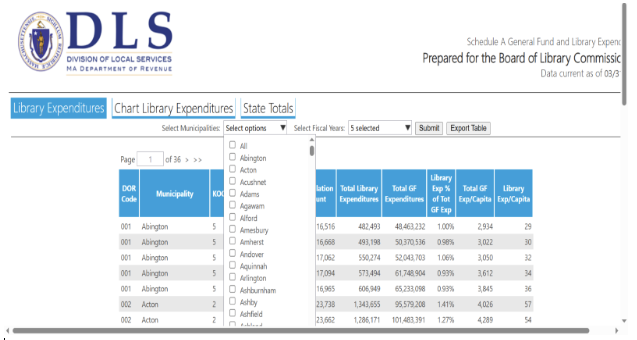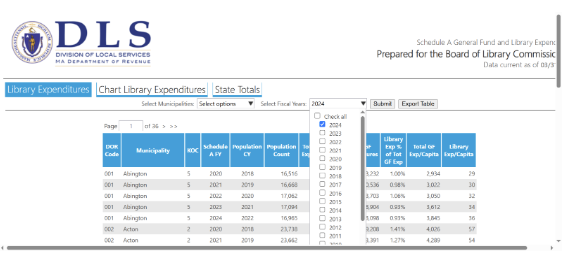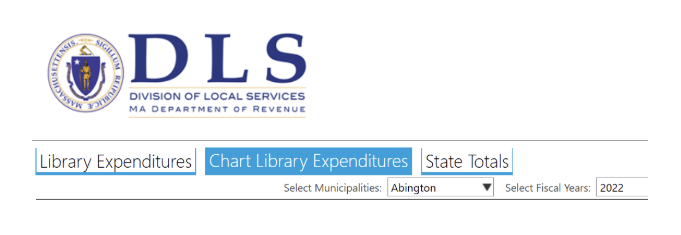🕙 MBLC Monthly Board Meeting on May 1st (Remote)
Contact: Rachel Masse
The regular monthly board meeting of the Massachusetts Board of Library Commissioners is scheduled for 10AM on Thursday, May 1st, 2025. This meeting is fully remote.
📰 House Ways and Means Level Funds Libraries
Contact: Celeste Bruno
On Wednesday, April 16, 2025, the Massachusetts House of Representatives Ways and Means Committee released their proposal for the FY2026 budget. Except for slight differences in the Massachusetts Board of Library Commissioners’ (MBLC) agency line (7000-9101) and Technology and Resource Sharing (7000-9506), the House proposal funds all MBLC budget lines at FY2025 levels which aligns with the Governor’s budget released in January. The full budget chart is available on the MBLC website. To read more about FY2026 level funding for libraries in Massachusetts, visit the MBLC website.
📰 Melrose Celebrates its New Library
Contact: Celeste Bruno
On April 15, 2025, Melrose residents were joined by state and local officials to celebrate the grand opening of the new Melrose Public Library. “The construction of any library, no matter the size, affirms the principles and freedoms we stand on,” said Commissioner Jessica Vilas Novas from the Massachusetts Board of Library Commissioners (MBLC). The project was partially funded with a $8 million grant through the MBLC’s Massachusetts Public Library Construction Program (MPLCP). To read more about Melrose’s new library, visit the MBLC website.
📰 Federal Uncertainty Causes Cuts
Contact: Celeste Bruno
In the wake of President Trump’s Executive Order 14238 that targeted the Institute of Museum and Library Services (IMLS) and the notice that the entire IMLS staff was put on administrative leave on March 31, the Massachusetts Board of Library Commissioners (MBLC) announced cuts to library services and grants at its monthly board meeting. To read more about cuts due to federal funding uncertainty, visit the MBLC website.
🏛️ Sharon Public Library Ribbon Cutting Ceremony
Monday, May 19 at 2P – More Information
A grand opening celebration will be held a tthe new Sharon Public Library at 1 School Street at 2PM on Monday, May 19. The event will include a ribbon cutting ceremony, a tour of the new library, mural unveiling in vesituble and the mural artist will speak in the new Community Room. Parking will be available at the library and at the High Street lot. To learn more about the Sharon Public Library project, visit the Town of Sharon’s website.
🗣️ ESOL Roundtable Discussion (Online)
Contact: Ally Dowds
Wednesday, April 30 at 1PM – Registration & Zoom Link
Connect with literacy coordinators and library staff to exchange ideas, collaborate on projects, and build a supportive community. Whether you’re an experienced educator, a new ESOL coordinator, or a librarian developing services and collections, this roundtable provides a forum to come together for meaningful discussion and resource sharing. Bring your questions, challenges, and successes!
🗨️ Preservation Office Hours Pop Up (Online)
Contact: Jess Colati
Friday, May 2 at 10AM – More Information & Zoom Link
Open to all interested in ensuring safe and stable storage and improving collection management for your library or organization’s preservation projects. Connect with the MBLC’s Preservation Specialist, Jess Colati and colleagues around the Commonwealth that work to advance the protection of cultural collections during monthly office hours. Sessions and chats are not recorded or saved.
🧊 Libraries as Cooling Centers: Every Library Can Be One! Presented by the Northeast Summit for Climate Adaptation for Library Facilities (Online)
Contact: Andrea Bono-Bunker
Tuesday, May 6 at 1PM – Registration & More Information
The Northeast Summit on Climate Adaptation for Library Facilities is pleased to announce this last webinar for the 2024-2025 season. The session will begin with a brief overview of what the term cooling center means. You may be surprised to find that your library is one, even if you weren’t using that term! There will also be a keynote speaker, Jared Ulmer, from the Vermont Department of Health and a panel discussion. This event is part of the Northeast Summit on Climate Adaptation for Library Facilities, a collaboration of the State Libraries from Maine to Maryland. This webinar was planned by the Rhode Island Office of Library & Information Services and the Vermont Department of Libraries.
🗨️ Preservation Office Hours (Online)
Contact: Jess Colati
Tuesday, May 6 at 10AM – More Information & Zoom Link
Tuesday, May 20 at 10AM – More Information & Zoom Link
Open to all interested in ensuring safe and stable storage and improving collection management for your library or organization’s preservation projects. Connect with the MBLC’s Preservation Specialist, Jess Colati and colleagues around the Commonwealth that work to advance the protection of cultural collections during monthly office hours. Sessions and chats are not recorded or saved.
📅 Rapid Response Federal Layoff Information Sessions, Presented by the MassHire Rapid Response Team (Online)
Contact: Ally Dowds
Tuesdays, May 6, 13, 20 & 27 at 12PM – Registration & More Information
MassHire is hosting a series of Federal Layoff Information Sessions to provide statewide, early intervention re-employment services to employees affected by layoffs and closings. Topics covered will include unemployment insurance eligibility, MassHire Career Center services and more. View or download the flyer to share information about these sessions and to register to attend. The MBLC will partner with MassHire in the near future to bring these sessions in person across the state. More information to come!
️➡️ Get to Know Your Government: The Massachusetts Office on Disability (Online)
Contact: Ally Dowds
Wednesday, May 7 at 2PM – Registration & Zoom Link
Join us for a conversation and Q&A with the Massachusetts Office on Disability (MOD) to learn more about this state agency, the guidance and support it provides to disability-related civil rights and architectural access, and a space to share feedback on how MOD can better serve both library staff and patrons. Registration is required.
🤝 So You Want to Be a Library Trustee? (Online)
Contact: Al Hayden
Wednesday, May 7 at 7PM – More Information & Zoom Link
Do you want to do more to advocate on behalf of your local public library? Are you considering running to be a Library Trustee? Join us to learn more about what your library does for your community, the role of a Library Trustee, what responsibilities you’ll encounter should you become a successful candidate. This program is a basic primer designed for people who are considering becoming a Library Trustee in their community, though new Trustees may find valuable information and are welcome to attend as well.
🖥️ State Aid Waiver Overview (Online)
Contact: Cate Merlin
Thursday, May 8 at 2PM – More Information & Zoom Link
As the FY26 budget cycle continues, learn about the process (and paperwork) required to apply for a waiver of the MAR, so you and your municipalities can be prepared.
🤝 Library Advisory Office Hours (Online)
Contact: Al Hayden
Monday, May 12 at 9AM – More Information & Zoom Link
Monday, May 26 at 2PM – More Information & Zoom Link
Open to all Directors, Trustees, Library Friends, and Foundation Members. They are designed to be an open-ended, safe space for questions and interaction among participants. Sessions will NOT be recorded, and chats will NOT be saved. Registration is not required; stop by anytime during the hour!
📈 Census Data for Libraries – Data on a Deadline (Online)
Contact: Al Hayden
Tuesday, May 13 at 2PM – More Information & Zoom Link
In this session we will explore census.gov and learn where to find and how to use a variety of data access tools that can quickly provide a snapshot of your community or state. Through short live demos you will gain insights about tools and resources such as QuickFacts, data.census.gov, Narrative Profiles, OnTheMap, Interactive Maps and more. Attendance at the previous two sessions is not required to join this session. All registrants will receive a Zoom link for the webinar the day before the event.
🖥️ B& T Connect Training (Online)
Contact: Cate Merlin
Tuesday, May 13 at 2PM – More Information & Zoom Link
B&T Connect is the data analysis and visualization counterpoint to B&T Collect. This training will walk you through the basics of creating and viewing data and charts using years of your library data (and data from all MA libraries), so you can better advocate for your libraries and communities.
💬 State Aid Office Hours (Online)
Contact: Cate Merlin
Wednesday, May 14 at 9AM – More Information & Zoom Link
Wednesday, May 28 at 2PM – More Information & Zoom Link
Join Cate Merlin, Head of State Programs, and your fellow Library Directors, Trustees, and others seeking advice and answers as we embark upon the FY2026 budget season. Make sure your next budget, materials spending, and hours open fully meet State Aid requirements, and share ideas for budget strategies with others- registration is not required, and session and chats will not be recorded or saved.
📞️ Massachusetts Behavioral Health Helpline
Contact: Ally Dowds
MBLC has partnered with the Department of Mental Health to help libraries serve their communities with the Massachusetts Behavioral Health Helpline, a statewide service that connects individuals directly to clinical help, when and where it is needed.
- Free, confidential, and no health insurance is required.
- Real-time interpretation in 200+ languages.
- Deaf or hard of hearing? Contact MassRelay at 711 or use your video relay or caption provider of choice.
📆 Save the Date! *June 18* Introduction to the Statewide Patron Portal (Online)
Contact: Jaccavrie McNeely
Wednesday, June 18 at 11A – More Information & Registration
Wednesday, June 18 at 2P – More Information & Registration
Join us on June 18th for an introduction to the Statewide Patron Portal at libraries.state.ma.us! This walkthrough and information session will introduce our revamped site, including the Library of Things search and the statewide events calendar. We’ll also discuss tagging events and updating your library’s information. Register for the 11 am morning session or the 2 pm afternoon session.
📜 MA250: Reading the Revolution–*LAST CALL* for your suggestions!
Contact: Courtney Andree (MCB), June Thammasnong
📋 MA250 Reading the Revolution Suggestions Form
🧰MA250 Reading the Revolution Toolkit
Reading the Revolution is a collaborative, statewide reading list to celebrate the 250th anniversary of American Independence. The Massachusetts Center of the Book and the MBLC invite you to share your suggestions for book titles, articles and online resources of untold and unsung histories in Massachusetts from the past 250 years. This is in partnership with Massachusetts250, a two-year campaign organized by the Massachusetts Office of Travel & Tourism to celebrate the 250th anniversary of the American Revolution.
🕙 MBLC Monthly Board Meeting on June 5th (Hybrid)
Contact: Rachel Masse
The regular monthly board meeting of the Massachusetts Board of Library Commissioners is scheduled for 10AM on Thursday, June 5th, 2025, at the MBLC Office, 90 Canal Street, Boston.




